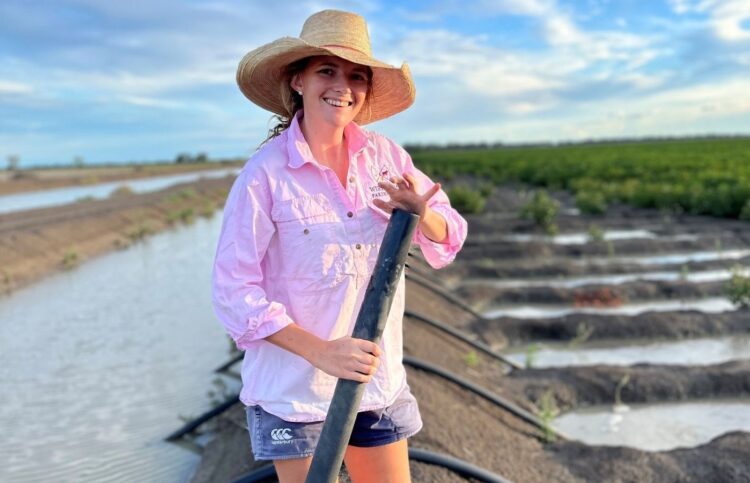

Standing side-by-side with cotton farmers from across Australia at the end of the season is what Kim Byrnes looks forward to every year.
Come August, Kim knows she will have played a big part in producing a crop of sustainable cotton at her parent’s Moree farm in Northern New South Wales.
Perhaps it’s maternal instinct, but there’s something about caring for 40 million baby cotton plants that Kim really enjoys.
When you spend such a lot of time planting and nurturing a seedling right through to cotton harvest time, farmers get a lot of satisfaction in seeing the end product.
Kim, 28, tried university in her teens but didn’t enjoy it. She wanted to be back on the farm working alongside her dad, raising awareness that women are more than capable of being successful cotton farmers.
Kim is also the Vice Chair of the Gwydir Valley Cotton Growers Association, a group of local farmers who work together to support their community and each other.
This year, Kim was selected to participate in the Australian cotton industry’s 2022 Future Cotton Leaders Program – a course supported by Cotton Australia and the Cotton Research and Development Corporation.
Like all participants selected, Kim’s ambition is to promote and ensure the future of the industry is viable.
Kim is one of eight women from 15 selected for the program, and like many participants wants to be part of a viable industry that recognises the important roles of women in cotton.
“It's been so great to see Australian brands get behind telling the real stories of women in cotton to their customers. Consumers are seeing the face of women in cotton, which is building a greater understanding of our industry.”
While Kim’s family farm is a mixed-farm operation, growing a variety of other crops and producing livestock, it’s cotton season she gets most excited about.
“Cotton is my favourite commodity on the farm. It takes a long time and effort to prepare, grow and support cotton through to picking time– it’s a very special job,” she said.
“I wouldn’t be the woman I am today without being a woman in the cotton industry.”
While International Women’s Day is an opportunity to advocate for equality and diversity in workplaces, it’s also a chance for Kim and her fellow female farmers to showcase their strength as Australian cotton farmers.
“Break the bias is such a strong theme this year. Australia in general has come a long way, but we are definitely still dealing with certain biases in relation to farming,” Kim said.
“Agriculture is often still perceived to be the typical male farmer out in the paddock with his wife nowhere to be seen, but of course this is not the case in reality. We need to break the bias by letting people know we are here, we are contributing and we can change the way we perceive women in agriculture.”
